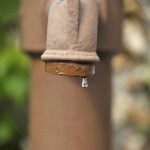In Brownwood, Unique Wastewater Plant Still Not a Done Deal

Photo Illustration by Christof Koepsel/Getty Images
The small city of Brownwood, Texas, wants to build a water plant that will treat sewage and return it to the city's drinking supplies. But locals are having a hard time getting used to the idea.
The small city of Brownwood, Texas could soon have something in common with the African nation of Namibia: a wastewater treatment facility that cleans wastewater (including the stuff from the bathroom) and returns it directly to city water pipes, where it becomes drinking water.
The Texas Commission on Environmental Quality approved construction of the wastewater facility, with conditions, in late December, Brownwood City Manager Bobby Rountree announced at a City Council meeting Tuesday. City officials don’t know when they will begin construction.
“Some people are extremely supportive, some are not,” Rountree tells StateImpact Texas. “It’s one of those issues: Unless you know all the facts, it’s a difficult issue to get concurrence on.”
Brownwood, population 19,000, has been gripped hard by the ongoing drought. Lake Brownwood, the town’s sole reservoir, is at about 50 percent capacity and dry weather patterns don’t seem to be changing much, Rountree says.
“We’ve been at stage-three water restrictions for 2 years. We don’t want to stay on that forever,” Rountree said.
The Brownwood wastewater facility would be the only one in the Western Hemisphere to employ direct-potable reuse. Big Spring, another West Texas town, is building a facility similar to Brownwood’s. But their plant will combine the wastewater with lake water prior to treatment.
While the idea of drinking treated sewage may seem revolting, it’s actually quite common. “Most people don’t understand, but you’re drinking it now,” Rountree says. “If you’re downstream from anywhere, your water has wastewater in it.” That’s the case for Houston, where some of their water comes from what Dallas flushes, treats and then sends down the Trinity River.
This latest approval by the TCEQ was just one of many on the road to construction. Last September, the Texas Water Development Board approved a loan of $12 million for the project. Brownwood must use those funds by Sept. 2014 or the price of construction could increase, Rountree said.
If and when the plant is built, a condition of the plant’s final approval notes the TCEQ must test the water’s quality before allowing it to enter the city’s pipes.

